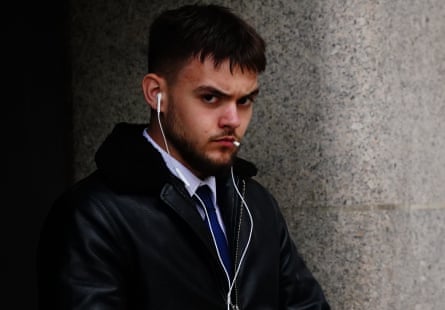A businessman with a “deep-seated grudge” against two barristers plotted for devices resembling bombs to be placed at the heart of London’s legal district to intimidate them, a court has heard.
The barristers were allegedly targeted because they had been acting for the National Crime Agency (NCA) in a case against Amanda Nuttall concerning suspicions of money laundering and other offences, which led to an order being made for the recovery of more than £1m of assets from her in 2019.
At the Old Bailey on Monday, the jury heard that her husband, Jonathan, harboured a “great deal of animosity” towards Andrew Sutcliffe KC and “to a lesser degree” Anne Jeavons, because of their work for the NCA.
Jonathan Nuttall, 50, of Romsey, Hampshire, is on trial with three others for conspiracy to plant two devices in Gray’s Inn “to cause widespread alarm” and mount a “a bold and targeted strike” against Sutcliffe. Michael Broddle, 46, of Hounslow, west London, has already admitted planting the devices and that he did so as part of a conspiracy, not working alone.
The prosecution’s case is that Broddle’s co-conspirators were Jonathan Nuttall, Michael Sode, 58, of Deptford, south-east London – the alleged “middleman”, who was Nuttall’s driver and an associate of Broddle – and Broddle’s two sons: Charlie, 18, and Joshua, 20. All four men deny being involved in the alleged plan.
On the afternoon of 14 September 2021, one of the devices was left close to a bench in Gray’s Inn Square and the other outside the barristers’ chambers – 3 Verulam Buildings – from which Sutcliffe and Jeavons worked.
Opening the prosecution case, Catherine Farrelly told the court: “At the time that device [outside their chambers] was left there, a smoke grenade was also let off, just to ensure that the device did not go unnoticed and maximum alarm was caused.
“These devices were left in both locations with a quite clear objective – to cause serious panic, thereby drawing significant attention. As you will hear, the objectives were accomplished: buildings were evacuated, roads cordoned off and a large number of police officers attended the scene.”

She said that forensic analysis suggested that the device left close to the bench was “potentially viable”. The other was not but “clearly designed to have the appearance of an improvised explosive device”.
The court heard both devices were accompanied by envelopes or packages with Sutcliffe’s name on them – one with a note containing a serious, false allegation against him – indicating that he was the “clear target” of events designed to “specifically cause him alarm, distress and public and professional embarrassment”.
The leaving of the devices was “not an isolated event” since Michael Broddle, with the assistance of his sons, had been conducting research and surveillance on the two barristers and their respective families for at least six months beforehand, the jury was told.
Farrelly said that a recording from Michael Broddle’s mobile phone, on 19 May 2021, showed a note being left at the entrance to Sutcliffe’s home, directed at his daughter, which said: “Either Sooty [Sutcliffe] QC stops digging his own grave or you will be raped whilst we dig up your brother[’s] grave.”
The barrister later confirmed that, as far as he was aware, the note had not been found by anyone in his family or any of his neighbours, said Farrelly.
The trial is expected to last two months.

